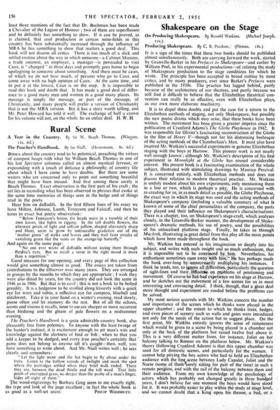Rural Scene
The Poacher's Handbook. By Ian Niall. (Heinemann. 8s. 6d.) BOOKS about the country tend to be polemical, preaching the virtues of compost heaps with what Sir William Beach Thomas in one of his last Spectator columns called an almost mystical fervour, or expounding with a touch of defiance a philosophy of country life about which I have come to have doubts. But there are some writers who are concerned only to point out something beautiful that might have been missed. And first among these surely is Beach Thomas. Exact observation is the first part of his craft ; the art lies in recording what has been observed in phrases that evoke at the same time memories of things seen in the hedge and of things read in the poets.
Hear him on daffodil's. In the first fifteen lines of his essay we have Milton, Johnson, Lamb, Tennyson. and Falstaff, and then he turns to exact but poetic observation:
" Below Tennyson's house, the heads wave in a tremble of their own leaves, like lights in rigging. In the tall double flowers, the alternate petals of light and saffron yellow, shaped alternately sharp and blunt, seem to grow by untraceable gradation out of the 'mother green' of stalks and leaves and they trail faint streaks of vanishing green like the veins on the orange-tip butterfly."
And again on the same page:
" No one ever wrote of daffodils without seeing them through Perdita's eyes. But to recall a verse in the right mood is more than a repetition."
Good measure for one opening, and every page of this collection would give something almost as good. The essays are taken from contributions to the Observer over many years. They are arranged in groups by the months to which they are appropriate ; I wish they were also dated by years, for the country did not look the same in 1946 as in 1906. But that is to cavil ; this is not a book to be bolted greedily. It is a hedgerow to be strolled along leisurely with a quick eye for wren and robin, a reflective eye for campion, bluebell and stitchwort. Take it in your hand on a winter's evening, read slowly, pause often and let memory do the rest. But of all the echoes, scents and visions it recalls, none to me are sharper or more recurrent than birdsong and the gleam of pale flowers on a midsummer evening.
7'he Poacher's Handbook is a quite admirable country book, also pleasantly free from polemics. To anyone with the least twinge of the hunter's instinct, it is excitement enough to pit man's wits and knowledge against the alertness of bird or fish ; when to that you add a keeper to be dodged, and every true poacher's certainty that - game does not belong to anyone till it's caught—then, well, you have something to write about. And Mr. Niall writes well ; he sees clearly and remembers: " Let the light wane and the bat begin to fly, about under the trees. Listen to the hollow sounds of twilight and mark the spot where the partridges settled when their brief walk ended. There they arc, between the dead' thistle and the tall weed. That 'little patch of uncropped grass. no deeper than the probe of a man's finger, hides all eight of them."
The wood-engravings by Barbara Greg seem to me exactly right, the type and look of the page excellent ; in fact the whole book is


































 Previous page
Previous page